 Your new post is loading...
Done right, content curation will become the easiest, yet most effective tool your marketing department will use. In fact, 90% of businesses agree. Of every 10 B2B marketers surveyed in a study by Curata, 9 used content marketing as a regular component of their strategy. 32% of business to business marketers did so daily. As a marketer, you’ve heard it before: you’ve got to build your personal brand. Self-proclaimed gurus have been shouting it from the rooftops for over a decade now, and the catchphrase has even become a bit stale. But tired as the declaration may be, there’s a lot of truth behind it. Consumers are becoming increasingly connected. And while social media can never replace good, old-fashioned market research, Twitter and LinkedIn are putting up a good fight. So what are you, as a marketer, meant to do? Should you spend your working hours creating the original, creative content the gurus demand? Should you build your “personal brand” by responding to Facebook comments all day? No. Instead, you should establish a healthy social media presence, and share, share, share....
Are you utilizing content creation tools and other resources to enhance your content Marketing Strategy? A few months ago, we shared with you What You Need to Know About Content Marketing. And shortly there after we followed that up with An 8-step Content Strategy that Works. Now it’s time to take it a step further and share some of the content creation tools and resources to help you hit the ground running with your content creation strategy....
It's easy to make a blunder, especially when you haphazardly post social media content without a time-sensitive marketing strategy or set your social feed on autopilot for an indefinite time. Missteps can occur in these instances; hence it is crucial to learn how to handle failure so you can avoid content curation mistakes. Your social media presence doesn't have to look like a jumbled mess if you apply the right social strategy. However, a lot of modern brands, unfortunately, fail at automating their social media while seeming like a robot. Brands struggle with finding the correct balance between applying a human touch to content creation and automation. The end result? A negative impact on follower growth and engagement. What are brands doing wrong with their content curation? How does this impact their social media strategy? Read on and use this as a reminder of what you shouldn't be doing with your content creation strategy....
Looking for a list of tools to help with content curation? Here are 8 excellent content curation tools well worth checking out. Content curation is the process of filtering through huge amounts of content from different online outlets to find the best content to share with your social media audience. And it’s something that most of us do. The following chart is taken from a survey conducted by Curata (content curation and content marketing platform), showing how businesses share curated content with their customers and prospects. As you can see, only 5% of those surveyed said that they never share curated content....
Which are the key traits, the skills and the know-how required to be a professional content curator? I have identified three groups of elements that characterize the profile of professional digital content curators: - General Traits - Communication Skills - Technical Know-How For each one of these, I have highlighted key elements by defining what each one means (DEF), why it is important for a curator to have (WHY) and how it can be cultivated (HOW)....
In these sections I analyze each one of these three groups, by highlighting key elements in each group by defining what they mean (DEF), why they are important for a curator to have (WHY) and how they can be cultivated (HOW). Here I analyze the key General Traits that make up the profile of a professional content curator. - Curiosity - Subject-Matter Expertise - Strong Ethics - Transparency - Disclosure - Empathy - Personal Voice - Pattern Recognition - Organization -Attention to Details - Being Systematic - Patience...

|
Scooped by
Jeff Domansky
July 19, 2017 11:38 PM
|
The key to monetizing curated content is to collect and organize information in a very specific niche and, whenever possible, for a specific audience and application.
The more specific a collection is, the easier it should be to monetize it, as this is where Google, Amazon and other large providers, cannot really compete with subject-matter specialists or communities of passionate users.
One apparent characterizing trait of commercially viable curated collections is that, often, a large part of the collection is publicly shared, for free.
Freely sharing high-value curated information collections provides credibility, authority, reputation and visibility to the curator/ author/ publisher who is not already a well-known authority in his sector, and these are a set of vital, necessary elements, for effective monetization.
As a matter of fact, by publicly sharing curated info-collections curators can tangibly showcase their expertise, competence and experience with the subject matter at hand....
Most people believe content curation is a relatively recent, Internet-born trend, generated by the constantly increasing amount of unverified information available online.
The general belief is that “content curation” is a content marketing tactic, designed to provide value to the reader and to save time and writing effort to the author/publisher. Such curation, according to most articles you find online, consists of searching and gathering already published content on a specific topic and to organize it together into a reading list, an anthology or a compilation.
In reality, the key elements of an editorial curation practice (finding, gathering, organizing/arranging, value adding, sharing) have a long history and have been utilized by man since thousands of years, to preserve, organize, uncover and highlight valuable poetry, philosophical ideas as well as historical and artistic works.
Historically, the need for curating content, appears to have arisen as a solution to two key needs:
1) to preserve valuable work before it would disappear
2) to facilitate the discovery and appreciation of valuable literary works, for future generations....

|
Scooped by
Jeff Domansky
July 13, 2017 12:07 AM
|
Top-notch examples of content curation at work. See the results, get inspired, sense the added value that organizing existing information can offer.
Though curation can be an impactful and excellent way to establish your brand online as well as serve the needs of your audience, it requires both art and science to see real benefit.
Is anything really new anyway? Does content have to be new to be relevant? How can you curate content from other industry leaders and still be relevant to your audience? Where do you draw the line of endorsing other people's content vs supporting their brand more than your own? What are the negatives of content regurgitation?
If these are some of the questions you have then take a listen to the 105th episode of the Social Zoom Factor podcast to learn the difference between creation, curation and regurgitation of content. I also include tips and strategies to develop your own curation platform and ensure you are not simply regurgitating content that will hurt you more than help.
Imagine, if you will, a world in which Richard Seaver or Robert Gottlieb had stomped their feet and huffed and puffed every time John Leonard forgot to give them their proper "hat tip." Or rather, as I joked on Twitter over the weekend about the new "Curator's Code," if Goethe had lived long enough to chide Mann for writing about Faust and giving a "ᔥ" to Marlowe but forgetting to give a "↬" to Goethe. It's funny to think about! But only for a minute, since after that it all just becomes too depressing for words, because what we talk about when we talk about curation first of all sure ain't curation and secondly isn't even all that special. But mostly it's depressing because it's a conversation that happens at the expense of original content itself. First, let's just get clear on the terminology here: "Curation" is an act performed by people with PhDs in art history; the business in which we're all engaged when we're tossing links around on the Internet is simple "sharing." And some of us are very good at that! (At least if we accept "very good" to mean "has a large audience.") But we should not delude ourselves for a moment into bestowing any special significance on this, because when we do this thing that so many of us like to call "curation" we're not providing any sort of ontology or semantic continuity beyond that of our own whimsy or taste or desire. "Interesting things" or "smart things" are not rubrics that make the collection and dissemination of data that happens on the Internet anything closer to a curatorial act; these categories are ultimately still reducible to "things I find appealing," and regardless of how special one might feel about the highly cultivated state of his or her tastes there is no threshold of how many other people are eager to be on the receiving end of whatever it is we're sharing that somehow magically transforms this act into curation—that is, at least, unless we're also comfortable with arguing that "curation" is the act in which Buzzfeed is engaged. Or The Huffington Post. Or the top contributor on those weightlifting comment boards....
Since my last piece on turbo-boosting content curation, I’ve fielded plenty of questions on my curation workflow. I’ve also seen more brand examples of content curation – some of which I like, some of which irritate me. I’ll show you a few. Curation can work well for brands, but it really starts with individuals. I define content curation as: The systematic process of sharing content from our expertise with our online networks. The “systematic” part is there for a reason – if we just compulsively retweet/share things we like, that’s not curation. That’s seat-of-pants....
Content curation is a great idea, but it’s really quite tedious to have to do it manually. You have to go out and find content you’d be interested in curating. Then you have to copy the link and paste it into each of your social networks. You have to schedule the post for an appropriate time, and you have to add your own spin to it, and you have to make sure it generates the right kind of preview or website card. Repeat for every link you want to share, ad nauseum, and you’re getting the idea. Thankfully, content curation is not a new idea, or a new industry. That means there are many businesses out there who have created products to help you. These content curation tools are designed specifically to curate content as smoothly as possible across your entire social media presence. Here are the best ones I recommend....
|
While content marketing may be just one part of a larger marketing strategy, it is clear that those businesses with the strongest content strategy have a huge advantage over competitors. If you want to be among the content elite, you cannot just write a blog post here and there, hoping something will get noticed. You need a well-developed strategy for content that effectively catches attention and meets the needs of your audience. Maybe you have a new business and haven’t yet started producing content. Or, maybe you’re already turning out content, but it just isn’t getting the response you want. Either way, what you need is a targeted strategy for creating and disseminating great content. To help you on the road to getting noticed for your content, here’s a list of strategy points that you can use and adapt to your specific needs....
Think of curated content the way you do a Works Cited section of a term paper. You use it to add relevance and to reinforce your argument. In marketing terms, that argument is that you are aware of the types of content that appeal to your audience. Responsible selection of curated content shows that you understand your audience. And when people believe that you understand them, it goes a long way toward building trust. A key difference, however, between content curation and a Works Cited section is that, quite often, the curated content comprises a significant slice of the content presented. In many cases, the content is presented with a short, original commentary. How well does that work? Well, look at the Huffington Post. They have practically elevated the concept of content curation to an art form. And they have discovered the fine balance between curation and branding. You’d barely know that they get a vast amount of their content from outside sources. It’s because they go to a tremendous effort to present the content in a way in which it practically becomes their own....
Content creation and content curation both serve very different purposes. The former is self-promoting, while the latter is cross-promoting. Don’t limit yourself to just one, or you’ll miss out on valuable opportunities from the other. To clarify, ‘created’ content is original – solely produced and owned by you. Every piece of content you create represents your company’s unique expertise, products, services, insights, and opinions. ‘Curated’ content is generated from external sources outside of your company that you share with your audience. It should be relevant and useful to your target audience and demonstrate that you recognise the value that other companies bring to your industry, or areas of relevant interest. Attainting the optimum balance between generating both created and curated content campaigns will depend on what you’re hoping to achieve – be it greater brand awareness, higher search rankings, optimal social engagement, or more conversions. Knowing the differences and usefulness of each type of content will help you make the right decision when developing your next content strategy – so here’s what you can achieve with each approach....
If we could be more productive, we can get a lot more done, right? Well, that’s how I see it. I’m always interested in finding new ways to become even more productive and get as much done as possible, as efficient as I can, allowing me to progress onto the next thing on my to-do-list. In this article, I’ll be sharing 10 brilliant content curation tools that will make you much more productive. In no particular order, these are my favourite tools for content curation....
In this section I analyze the key Communication Skills that make up the profile of a professional content curator: - Editorial Focus - Effective Writing - Contextualizing Information -Design - Visualizations and Verification - Comparing - Referencing - Crowdsourcing...
The challenge for companies that do not have the creative freedom to begin at square one is how do we create that same culture of innovation? How do we build an environment where we are comfortable at chipping away the things that no longer add value? How many systems would we switch off as opposed to trying to integrate them with the new? How much complexity in our processes could we design out to create something that is elegant and simple? For me, this feels very different from how most large organizations function. But if we are going to create magnificent works of art within our day-to-day working lives, we need to embrace the concept of curation – of removing the superfluous and keeping only that which is beautiful in its simplicity....
Imagine if an art museum contained every single painting created over a hundred-year period. It wouldn’t be much fun to visit, right? Hundreds of thousands of images, of wildly varying quality, without organization or context? It would be like a Google image search crossed with a garage sale.
Content curation is what turns a warehouse full of art and artifacts into a museum. A good curator sifts through the content to find pieces that are valuable for an intended audience. Their job is to direct attention to worthy content—and in doing so, make the museum a worthwhile place to visit.
Your blog readers and social media followers are drowning in content. You can be the content curator that helps direct their attention to what is most helpful, educational, or entertaining. Content curation, as part of your editorial strategy, can help make your blog a more valuable destination for your readers.
But the benefits go both ways; as you help your readers find great content, you’re helping your organization, too. Here are just a few ways curated content can help advance your marketing goals, and some of our favorite curating tools.
To gain readers’ attention and trust it is evidently not enough to create a top 10 tools list by searching on Google and then picking the best items from existing lists, or to pull together a few interesting article titles on a topic with their introductory paragraphs.
Unless your readers are not very interested themselves into the topic you cover, why would they take recommendations from someone who has not even had the time to fully vet and verify his own suggested resources?
Picking what superficially appears to be interesting content just by reading titles or curating and suggesting content to your readers by leveraging tools that do this automatically is like recommending movies or music records based on how much you like their trailers or their cover layouts.
By using this approach how many times are you going to recommend truly valuable resources versus how many times is your recommendation going to lower your credibility and authority just because the content you have recommended is actually quite shallow, provides no new insight, or it is even copied from somewhere else?

|
Scooped by
Jeff Domansky
July 13, 2017 12:01 AM
|
My weekend blog post routine includes posting links to a handful of tools or great content I ran across during the week.
I don’t go into depth about the finds, but encourage you to check them out if they sound interesting. The photo in the post is a favorite for the week from an online source or one that I took out there on the road.
Crayon – Get complete competitive insights on over 2.2 million companies to drive your marketing strategy.
Content Curation on Pinterest – Top-notch examples of content curation at work. See the results, get inspired, sense the added value that organizing existing information can offer.
MotionDen – A simple online video maker, MotionDen is the best way to make animated videos.
These are my weekend favs, I would love to hear about some of yours – Tweet me @ducttape
Content curation is all about mining the internet for material that can be shared on your social networks. It’s about finding great content and presenting it to your social media followers in a way that’s organized and meaningful.
The thing is, you’re probably not thinking strategically when you’re scrolling through your phone and posting from bed in the morning.
Content curation strategy is what makes the difference between mediocre and exceptional content curation in business.
Strategy is a must when it comes to content marketing, which includes content curation....
Most of us try to find the Google answers to at least 3 – 4 questions on a daily basis. Considering this, the apps or websites which host content about which people ask questions are bound to have huge traffic rates. Wouldn’t you want your website or app to be one of the most talked-about ones? Wouldn’t you want to put up content which prompts user discussions and helps keep you in the news? Finding content ideas that trigger user interaction to bring about a real change in your field of work is a very challenging task. All the more if you need to put up such content on a regular basis. What would help would be a way in which you could find what makes users tick every now and then. What are things people like talking or asking questions about? Bloomberry is a unique online tool that lets you find out just that....
Content curation. You’ve probably heard about it, you might have even read a few pieces on the subject but you never really went through it. How many times did it happen to get a topic idea and start writing on it immediately? And after you’ve hit publish you didn’t get the expected results. The curated content marketing technique can actually boost SEO. Big time. And below you can find some case studies that prove exactly that....
|






 Your new post is loading...
Your new post is loading...




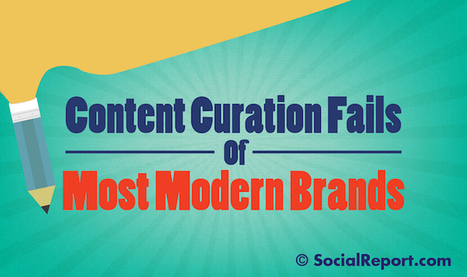
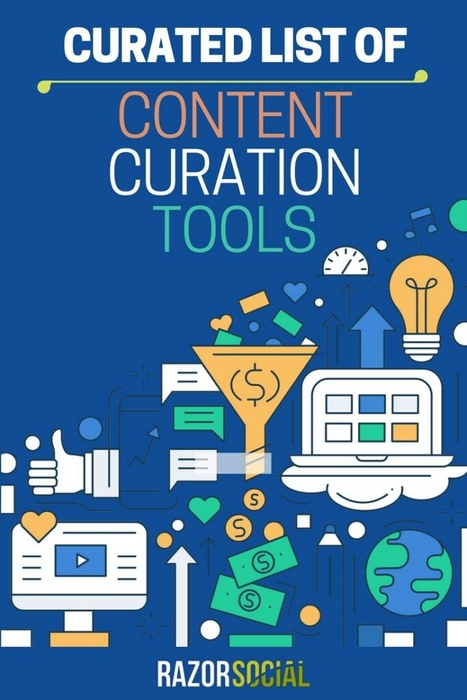






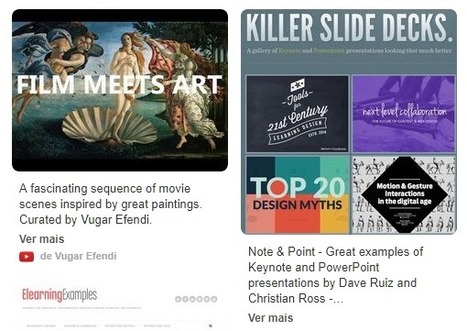

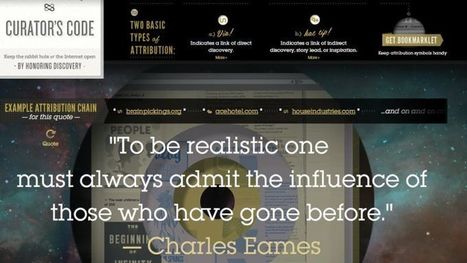

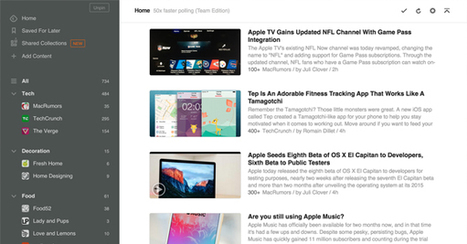


















HootSuite shares an excellent guide and overview of content curation.